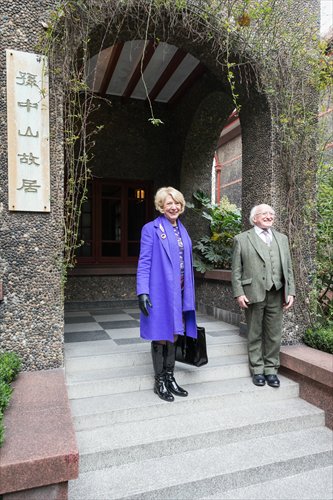

Irish President Michael D. Higgins and his wife Sabina Higgins stand on a garden veranda at the former residence of Sun Yat-sen Thursday, where George Bernard Shaw and Soong Ching Ling once took a photo together. Photo: Courtesy of the Irish Consulate General in Shanghai
Western countries should exercise restraint before proposing any ready-made solutions to China's environmental problems, Irish President Michael D. Higgins said at Fudan University Friday during an eight-day state visit to China.
Speaking about the importance of multilaterism, Higgins discussed how China and Ireland have dealt with several current global challenges that most countries are facing, such as environmental protection and food security.
"Water pollution and water shortages, soil pollution and desertification, and energy scarcity - these are all issues which the Chinese government recognizes and to which it is actively seeking to respond," Higgins said, adding that China will have to develop its own model to improve its environment. "Westerners can hardly invoke moral superiority on environmental matters when, through history, they have contributed significantly to pollution in developing countries."
With the establishment of a multilateral world, the Chinese people are in a position to explore the possibilities for new models of development. Higgins said these models would hopefully be inclusive of the mass of the people, in terms of social protection, political participation, and cultural expression.
Higgins encourages young people to take an active part in the country's political and social affairs. "It is the job of governments to define objectives, make policy decisions and take action accordingly," he said. "However, it is the job of young people…to make sure the decision-makers remain focused on the goal of handing on a safe and hospitable world to future generations."
Higgins also believes that students in China and Ireland play a fundamental role in advancing the intercultural ties between the two countries. Earlier that day, Ireland's leading university, Trinity College Dublin, signed a memorandum of understanding and a student exchange agreement with Fudan University. "I was delighted to witness the signing event, which will promote the two countries' student exchanges and joint research, especially in the field of humanities," he said.
Each year there are some 1,200 Chinese students going to Ireland to study, said Yang Jie, a senior education advisor at Commerce Section with the Embassy of Ireland. "We hope to increase the number to 4,000 in the future, 1 percent of the annual number of Chinese people studying overseas," he told the Global Times.
Ireland is setting its sights on Chinese students. By now its colleges have signed more than 160 student exchange agreements with Chinese schools, encouraging students of the two countries to live and study in the other country. "Meanwhile, nearly 1,200 Chinese students are involved in China-Ireland joint research programs at home," Yang said.
At China's universities, there are seven or eight Ireland Study Centers, where the experts and scholars mainly study Irish literature, he added.
When discussing Irish literature, Chinese people usually first think of George Bernard Shaw, a famous Irish playwright and intellectual who once visited Shanghai in the 1930s. Last Thursday, during their two-day stay in Shanghai, Higgins and his wife Sabina Higgins visited the former residence of Sun Yat-sen, the founder of The Republic of China (1912-1949), to commemorate Shaw's visit there in February 1933.
"Shaw's visit to Shanghai coincided with an era of great turbulence globally - a period when the foreign powers were pushing rival claims onto China, as the Chinese people struggled to assert national sovereignty," Higgins said.
When Shaw first came to Shanghai in 1933, he was received by Sun's widow Soong Ching Ling at Sun's former residence on 29 Rue de Moliere, now 7 Xiangshan Road. They were both honorary chairpersons of the World Committee against Imperialist War at the time.
At Sun's former residence, Shaw talked to Soong as well as some leaders from the China Civil Rights League. This brief meeting was considered as one of the most significant contacts in the 20th century between an Irish writer and Chinese intellectuals.
On Thursday, standing on a garden veranda where Shaw and Soong once took a photo together, Higgins said that his visit was to commemorate Shaw's encounter with Soong and other Chinese intellectuals in Shanghai, which captured the importance of the international exchanges of ideas. "I believe that, today again, great creations can come out of the renewed intellectual, cultural and scholarly engagement between the Chinese and the Irish," he added.
Copyright ©1999-2018
Chinanews.com. All rights reserved.
Reproduction in whole or in part without permission is prohibited.